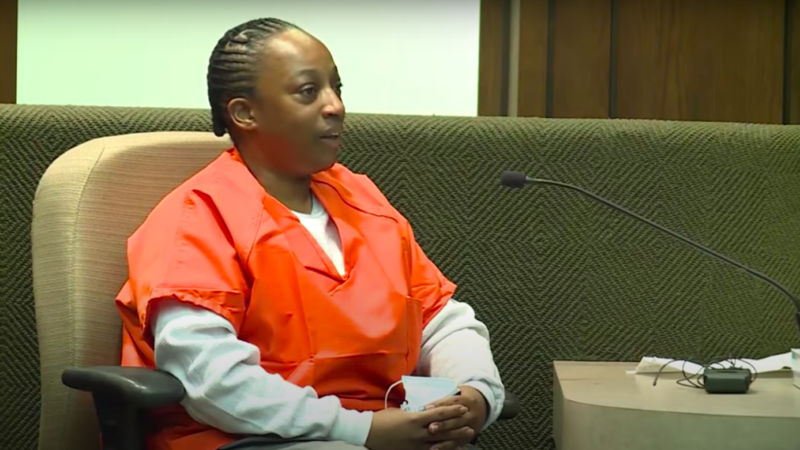
A Tennessee woman was sentenced last month to six years and one day in prison for illegally registering to vote while on probation. Given the nature of the offense, that punishment has been widely characterized as unnecessarily harsh by activists, advocacy groups, and the prosecutor who sought it.
One of these things is not like the other. But while Shelby County District Attorney Amy Weirich agrees that prison term isn't proportional to the offense, she says it is justified for a different reason: the defendant, Pamela Moses, insisted on going to trial.
"I gave her a chance to plead to a misdemeanor with no prison time," Weirich said in a statement. "She requested a jury trial instead. She set this unfortunate result in motion and a jury of her peers heard the evidence and convicted her."
Six years of freedom is quite the steep price to pay for exercising her constitutional right to trial.
In September 2019, Moses—who lost her voting rights after a 2015 conviction—requested that the corrections department approve a certificate to restore her right to vote, which would require the agency to confirm she had completed her probation. An officer did so and signed off.
Yet Moses' voting rights could not be restored, because the officer was wrong: Her probation wouldn't be complete until April 2022—something a judge had recently ruled on, and which the state contends Moses was well aware of prior to turning in the form.
"The narrative is that this was a voting mistake," says Larry Buser, who does research, development, and special projects for the Shelby County District Attorney's Office. "That's not what happened." Though Moses argued it was an honest error—after all, a corrections officer signed off on her paperwork—a jury didn't buy it. "Defense counsel argued that the negligence of the probation officer in relying on the Defendant's statements and his incomplete search of her records somehow excused the Defendant from her fraudulent conduct," wrote Judge W. Mark Ward in his sentencing memo. "This argument does not establish a defense under the law. It is tantamount to an argument that a person who obtains money from a bank by posing as another person is not criminally responsible because the bank should have discovered the fraud and not given money to the thief."
Moses maintains she was genuinely ill-informed. "She is right in every form, fashion to believe…that her sentence has expired, because they are the keepers' of her record," says Bede Anyanwu, Moses' attorney. "Anybody faulting her should go and examine his or her brain."
But whether or not Moses is guilty isn't a topic I'm interested in litigating. I'm more interested in the admission from DA Weirich, who, guilt or innocence aside, has acknowledged that the lengthy prison stay Moses will have is an "unfortunate result" of a defendant wanting a jury to hear her case.
Weirich's statement came in response to a segment on Rachel Maddow's MSNBC show. During that slot, the host compared Moses' case to four other voter fraud cases centered around white Republican men who usurped dead relatives' identities to vote for former President Donald Trump; three received probation, while the fourth served three days in jail. That's evocative of "two justice systems," said Maddow.
In other words, Weirich's statement was meant to rebut those claims: Moses, too, could have taken advantage of a good deal should she have wanted to. Yet that's not necessarily the strong argument Weirich thinks it is, says Carissa Byrne Hessick, a professor of law at UNC Chapel Hill and author of Punishment Without Trial: Why Plea Bargaining Is a Bad Deal. "What's stunning to me is that there is just no recognition by people inside the criminal justice system," she tells me, "that sending someone to prison for six years for exercising their constitutional right isn't equally problematic and disturbing."
Jury trials are unpredictable, time-consuming, and expensive, which explains why the government now resolves about 97 percent of cases with plea bargains. Those bargaining tactics can be coercive, aptly demonstrated by Weirich's statement: Defendants are told time and time again that, should they insist on inconveniencing the government with a trial, they'll pay for it with their liberty.
It's "utterly typical and common," says Ken White, a partner at Brown White & Osborn LLP and the man behind the popular "Popehat" Twitter account. "Prosecutors have vast power to make decisions about who gets offered what deal, and, as a result, can put people in a position where they're choosing between admitting to something they didn't do, or giving up defenses and facing a much longer sentence."
That an innocent person would willingly plead guilty to a crime they didn't commit may sound nonsensical. It sounds less so, however, when considering the choice before them: Plead guilty and minimize damage, or go to trial and risk years off your life.
Such was the crossroads in front of Levonta Barker, for instance, an Arizona man who received a 7.5-year plea deal for aggravated assault and kidnapping. The Maricopa County Attorney's Office threatened him with a "substantially harsher" punishment if he even wanted to see the evidence against him. But there was no evidence against him, because he was innocent. His attorney ultimately pointed out that, per police reports, Barker was wearing a different outfit than the one the perpetrator was seen in—something the government had not bothered to verify. He spent a month in jail before he was released.
Not everyone is so fortunate, if you can call it that. "I do this all the time. I see people accepting…pleas on charges they did not commit," says Anyanwu. "And that is very, very disheartening."
The post Pamela Moses 'Requested a Jury Trial.' So She Got 6 Years in Prison. appeared first on Reason.com.







